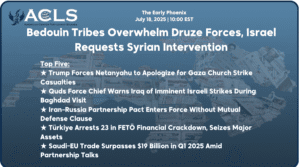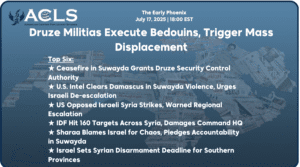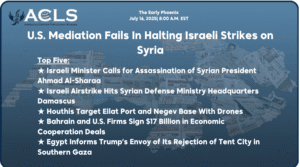TOP HEADLINES:
- Israeli Air Strikes Target Regime and Iranian Militia Locations Near Damascus
- Houthi Militia Loots More Than 4.6 Trillion Riyals in Yemen
- Iran’s Revolutionary Guard Navy Claims Owning Cutting-Edge AI-Enhanced Missiles and Drones
- Large-Scale Drug Trafficking Network Exposed and Dismantled by Iraqi Authorities
- Saudi Embassy Calls for Swift Exit of Citizens from Lebanon Amidst Security Concerns; Lebanese PM Assures Arab Allies
TURKIYE
- EU to Discuss Türkiye Visa Liberalization in Autumn Amid Accession Talks (Daily Sabah). A senior EU official revealed plans to address visa liberalization for Türkiye during upcoming autumn discussions…Ankara has urged renewed engagement in the accession process, Customs Union updates, high-level dialogues, and counterterrorism collaboration.
- Erdoğan to Lead Cabinet Meeting Addressing Russia-Ukraine War, Suspended Grain Corridor, and Economic Plans (Hurriyet Daily News). Turkish President Recep Tayyip Erdoğan will oversee an upcoming cabinet meeting to discuss urgent matters like the suspended Black Sea grain corridor agreement due to Russia’s withdrawal. The focus will be on potential solutions, impact on global grain prices, ahead of Putin’s expected visit in August. Turkish Foreign Minister Hakan Fidan’s phone discussions with US and Ukrainian counterparts to extend the grain deal will be highlighted, along with other topics like collective bargaining and regional developments.
ISRAEL AND PALESTINIAN TERRITORIES
- Israeli High Court Interferes in Recusal Law, Signals Potential Intervention (Times of Israel). The Israeli High Court of Justice has issued an interim injunction regarding the recusal law passed by the coalition, expanding the panel to 11 justices and suggesting possible intervention against the law. The law eliminates the ability of the court or attorney general to order a prime minister to recuse themselves from office. The court’s injunction instructs key authorities to explain why the law should not take effect at a later date, indicating the court’s consideration of an “interpretative” solution. The law, seemingly tailored for Prime Minister Benjamin Netanyahu, has faced criticism and legal challenges.
- Hamas Quashes Gaza Protests Demanding Economic Improvement (Jerusalem Post). Hamas security forces and militants successfully thwarted attempts by Palestinian activists to launch large-scale protests throughout Gaza to demand economic relief and an end to power and gas shortages. Hundreds of Hamas officers and gunmen were deployed, conducting searches and setting up roadblocks. Despite this, small protests occurred in some areas, with clashes reported between demonstrators and undercover security officers. A senior Hamas official claimed the Palestinian Authority was behind the protests with the aim of removing Hamas from power. Critics argue the protests highlight growing frustration with Hamas’ governance.
EGYPT & NORTH AFRICA
- New President Elected for Libya’s Supreme Council Amidst Push for Election Law Resolution (Libya Akhbar). Muhammad Moftah Takala becomes Libya’s Supreme Council of State president with 67 votes, after a close contest with Khaled Al-Mashri. The Council’s roles include choosing the government and submitting budget observations. UN envoy urges swift election law finalization. Haftar discussions stress election necessity and law significance in resolving political tensions. For the most updated news of North Africa’s event, read this week’s The Region.
The GULF REGION & YEMEN
- Iran Issues Warning Amidst Dispute Over Disputed Islands with UAE (Al Khaleej Online). Iranian General Staff Spokesperson Brigadier General Abu al-Fadl Shikarji issued a warning implied to the UAE. Shikarji’s statement, reported by the Iranian “Tasnim” agency, cautions that such “greedy people” should consider Iran’s military capabilities before making any ill-advised moves.
- Houthi Militia Plunders Over 4.6 Trillion Riyals in Yemen (Yemen-Window). The internationally recognized Yemeni government disclosed that between 2022 and 2023, the Houthi militia, supported by Iran, looted over 4.6 trillion riyals from six sectors under its control. The government’s Minister of Information, Muammar Al-Eryani, stated that this amount, three times the state’s 2014 revenues, includes funds seized from taxes, customs, zakat, endowments, oil, and gas. The Houthi militia intensified looting public revenues, notably taxes and customs for oil, and even sold Iranian oil and gas at inflated local prices. Despite misleading actions, the group continues to strip public funds while demanding state salaries.
IRAN
- Iran Bolsters Navy with Missiles and Drones as US Proposes Guards for Gulf Ships (New Arab). Iran has announced arming its Revolutionary Guards’ navy with drones and missiles, including those with a range of 300 to 1,000 km. This move comes as the US considers placing guards on commercial ships passing through the Gulf to counter potential Iranian threats. The increased naval capabilities could escalate tensions in the region, especially in the Strait of Hormuz, a critical waterway for global oil shipments.
- Iran Expands Intelligence Apparatus to Quell Domestic Opposition (Iran International). The Islamic Republic of Iran is poised to create a fourth central intelligence agency in response to mounting domestic opposition and potential protests. The government intends to elevate its judiciary’s current “protection and intelligence” department to an official intelligence “Organization,” providing it with increased authority and funding for internal repression…This new intelligence organization will join the Ministry of Intelligence, the IRGC’s intelligence division, and the police intelligence organization in surveilling citizens and curbing dissent.
- Ukraine and European Allies Enforce Sanctions on Iran Amid Stalled Diplomatic Talks in Saudi Arabia (Bayan Media). Simultaneously with the escalation of mutual attacks between Russia and Ukraine, including against each other’s fleets in the Black Sea, and in a situation where the Jeddah meeting is underway to review ways to end the war, Ukraine and seven other countries in the European economic sphere have imposed EU sanctions against the Iranian regime for arming Russia. Ukrainian media quoted the statement of the Council of Europe and announced that the government of Kiev, together with the countries of Norway, Iceland, Liechtenstein, Albania, Montenegro, North Macedonia and Bosnia and Herzegovina, together with the European Union, supported Iran in a “war of aggression”. They called it “unreasonable and illegal”.
- Iran’s IRGC Navy Claims to Have Advanced AI-Powered Missiles and Drones (Fars News). Iran’s IRGC Navy showcases advanced indigenous military gear including AI-powered missiles, drones, and electronic warfare systems. The weaponry boasts longer endurance for drones, AI-enhanced cruise missiles, and precise targeting. As tensions escalate with the United States in the Strait of Hormuz, Iran has provided its Revolutionary Guard’s navy with drones and missiles boasting a range of 1,000 kilometers.
- UK Home Secretary Warns of Iran’s Growing Threat to National Security (Arab News). Suella Braverman, the British Home Secretary, has cautioned that Iran poses a significant threat to UK national security. Concerns have arisen about Iranian intelligence agents reportedly collaborating with criminal gangs to target regime opponents. Recent reports indicate that Iran’s aggression is increasing, with halted assassination plots and intimidations within the UK. The regime’s links with organizations such as the Islamic Students Association of Britain have also raised concerns. Despite debate over proscribing the Islamic Revolutionary Guard Corps (IRGC) as a terrorist organization, the UK government has chosen to focus on targeted sanctions against key decision makers in Iran.
SYRIA
- Ukrainian Drones Strike Russian Oil Tanker in Kerch Strait, Affecting Fuel Supply to Syrian Warplanes (Shaam News). Reports reveal that a Russian oil tanker, the SIG, has been damaged in the Kerch Strait after being targeted by Ukrainian drones. The tanker, which was supplying fuel to warplanes in Syria, faced a brief traffic halt on the strategic bridge connecting Crimea with Russia. Tensions have escalated in the Black Sea region as Ukraine’s actions, including targeting Russian vessels and repelling air strikes, amplify the ongoing geopolitical crisis.
- Israeli Airstrikes Target Syrian Regime and Iranian Militia Sites Near Damascus (Syria TV). Israeli warplanes fired four missiles at military sites belonging to the Syrian regime and Iranian militias near Damascus. The targeted area included “Minin Warehouses,” used by Iranian militias for storage, located between Saydnaya and Menin, north of the city. The strikes were reported to have targeted high-ranking Assad regime officials.
IRAQ
- Iraq Recovers Land on Iranian Border Amid Controversy Over Border Concessions (Al Sharq Al Awsat). Controversy surrounds Kuwaiti thanks to Basra’s governor over Umm Qasr. Amid the debate, news circulated about Iraq conceding to Iran in railway agreements. Iraqi officials deny ceding Umm Qasr to Kuwait or making further concessions to Iran in railway deals, countering earlier reports and social media claims.
- Baghdad Asks Washington and London to Hand Over Officials Involved in the “Theft of the Century” (Al Sharq Al Awsat). Iraqi Integrity Commission calls for extradition of ex-officials involved in “theft of the century” case. Head of commission, Haider Hanoun, urges US and UK to extradite former PM office director, intelligence service head, and ex-finance minister for stealing tax secretariats’ funds. Red notices issued via Interpol target those with US and British citizenship. Hanoun emphasizes commitment to pursuing justice and recovering stolen money.
- Iraqi Authorities Dismantle Major Drug Trafficking Network Extending Across Regions (Elaph). Iraqi authorities have successfully dismantled a significant drug trafficking network responsible for supplying and exporting narcotic pills and opium across multiple regions. The operation, supervised by the Minister of Interior, Abdul Amir Al-Shammari, in coordination with the Kurdistan region, led to the arrest of eight individuals involved in trafficking Captagon pills and opium. A factory producing Captagon pills was also discovered in Muthanna province. This action follows recent efforts to combat drug-related crimes in Iraq, where drug trafficking and abuse have become widespread concerns.
LEBANON
- Saudi Embassy Urges Citizens to Leave Lebanon Amid Armed Conflict Concerns (Zaman Al Wsl). The Saudi embassy in Beirut has issued a statement advising its citizens to promptly depart from Lebanese territory and avoid conflict areas. The embassy emphasized adherence to the decision barring Saudis from traveling to Lebanon. The advisory comes in the wake of clashes between Palestinian factions and armed groups, resulting in casualties.
- Lebanese PM Reassures Arab Nations Amid Embassy Warnings (Al Nahar). Lebanese Prime Minister Najib Mikati has responded to the warnings issued by the Saudi Arabian, Kuwaiti, and German embassies to their citizens in Lebanon. Mikati, after consulting with military and security leaders, stated that the overall security situation does not warrant panic. He directed Foreign Minister Abdullah Bou Habib to reassure Arab nations about their citizens’ safety and urged Interior Minister Bassam Mawlawi to convene the Central Security Council to address potential challenges and maintain security across the country.
| Country | Exchange Rate |
| Egypt | 1 US Dollar = 30 EGP |
| Iran | 1 US Dollar = 49,700 IRR |
| Lebanon | 1 US Dollar = 92,000 LBP |
| Syria | 1 US Dollar = 12,350 SYP |
| Türkiye | 1 US Dollar = 27,2 TL |



